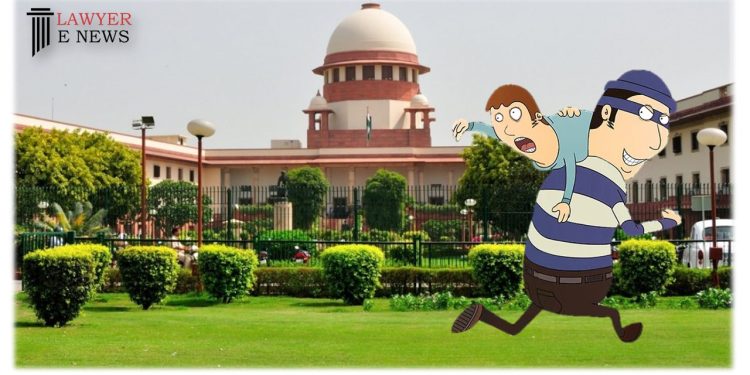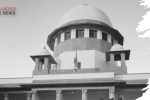Supreme Court Interpret Section 364A of IPC in Child Kidnapping Case .

Supreme Court in a recent Judgement (RAVI DHINGRA Vs. THE STATE OF HARYANA D.D 01 March 2023 ) held that to prove the offence U/s 364 A IPC, it is necessary to show that the accused not only kidnapped or abetted someone but also threatened to cause death or hurt to them or gave rise to a reasonable apprehension that such a person might be put to death or hurt or caused hurt or death to such a person to compel the government, foreign state, inter-governmental organization, or any other person to do or abstain from doing any act or to pay a ransom.
Facts
The case pertains to the kidnapping of a 14-year-old boy, Harsh Sobti, son of Dr. H.K. Sobti, on his way to school, and the subsequent demand for a ransom of Rs.50 lakhs. The victim was released after the payment of Rs.12 lakhs, and four accused persons were apprehended by the police. The trial court charged the accused with offences under Sections 364, 364A, 342, 506 read with Section 148 of the IPC. The prosecution presented 27 witnesses and 72 documentary Exhibits. The accused argued that they were falsely implicated and tortured before being presented before the court. The Trial Court held that the accused formed an unlawful assembly and kidnapped PW-21 to compel his father to pay the ransom. The appellants were convicted and sentenced for kidnapping for ransom under Section 364A of the Indian Penal Code (IPC).
They appealed before the Punjab and Haryana High Court, which upheld the conviction and rejected the plea for modification of the conviction to a lesser offence. The High Court relied on the testimony of prosecution witnesses, including a child witness, and held that the connection of the accused with the crime had been established beyond reasonable doubt.
The accused approached the Supreme Court, challenging the decision of the High Court.
Argument
The appellants in this case have appealed to the Supreme Court arguing that there is doubt about their involvement in the kidnapping of Harsh Sobti, PW-21, but have not raised any questions about the investigation. They have requested that their conviction under Section 364A of the IPC be modified to a conviction under Section 363 of the IPC. The appellants’ counsel argued that the essential ingredients of Section 364A of the IPC have not been proven and that PW-21’s statement before the Court was a substantial improvement upon the statement made to the police. The state’s counsel argued that there is no merit in the appeals and that the High Court was justified in its reasoning.
Observed and Held by Hon’ble Supreme Court
The Supreme Court notes that the graded approach of the Parliament while criminalizing the act of kidnapping must be carefully interpreted. Section 363 of the IPC punishes the act of kidnapping, Section 364 thereof punishes the offence of kidnapping or abduction of a person in order to murder him, and Section 364A adds to the gravity of the offence by involving an instance of coercive violence or substantial threat thereof, to make a demand for ransom. The Court reiterates its observations in Lohit Kaushal vs. State of Haryana that the gravity of the crime should not influence the court’s judgment and that a fair trial must be ensured, with objectivity and judicial considerations while evaluating the evidence.
The Court has laid down the ingredients of the offense U/s 364 A IPC to prove the offense, it is necessary to show that the accused not only kidnapped or abetted someone but also threatened to cause death or hurt to them or gave rise to a reasonable apprehension that such a person might be put to death or hurt or caused hurt or death to such a person to compel the government, foreign state, inter-governmental organization, or any other person to do or abstain from doing any act or to pay a ransom.
The court analyzes the two statements made by PW-21, one to the police and the other before the Trial Court and observes three crucial changes in the second statement. These changes are significant in proving the second ingredient of the charge under Section 364A and essential to bring home the guilt under this section. The court concludes that this ingredient has not been proved beyond reasonable doubt, and the Courts below did not address this doubt before convicting the appellants. The court emphasizes that the intimidation of the child victim, for the purpose of making him silent, cannot be enough to prove the element of threat under Section 364A. If the evidentiary threshold for this offense is so low, the difference between punishments for kidnapping under 363, 364, and 364A shall become meaningless.
The Supreme Court has the power to alter charges under Section 216 of the Criminal Procedure Code, as long as it does not cause prejudice to the accused. The court can exercise this power even after the completion of evidence, arguments, and reserving of judgment. The court may add or alter a charge if there was an omission in the framing of charge or if the material brought on record leads the court to form a presumptive opinion as to the existence of the factual ingredients constituting the alleged offence. The court must exercise its powers judiciously and ensure that no prejudice is caused to the accused and that they are allowed to have a fair trial.
In this case, the Supreme Court sets aside the conviction under Section 364A of the IPC and convicts the appellants for the offence under Section 363 of the IPC, i.e., kidnapping, sentencing them to imprisonment for seven years and a fine of Rs. 2000/-.
RAVI DHINGRA Vs. THE STATE OF HARYANA






